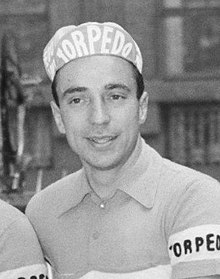Manfred Donike (cyclist, 1933)
Manfred Donike (born August 23, 1933 in Köttingen near Cologne ; † August 21, 1995 on the flight from Frankfurt am Main to Johannesburg ) was a German cyclist and chemist and best known as a doping investigator. Donike lived in Düren-Rölsdorf .
Athletic career
Manfred Donike began his sporting career as an amateur with the Hürth cycling company in 1919 and was the club's figurehead until he switched to the professional camp (dust cloud Refrath 1952). Several times he won the club championship at the road races "Around Hürth" at that time. He learned to ride a train at the Hürth cycling track . Donike was a successful train driver in the 1950s with partners Paul Vadder and Dieter Gieseler . With Vadder he was German amateur champion in two-man team driving in 1954 and later (1955–1972) professional driver. In 1958 he and Edi Gieseler became German professional driver championship in two-man team driving. Donike drove several six-day races, also in the USA, including as a partner of the 1952 road world champion Heinz Müller (Schwenningen). In 1960 and 1961 Donike took part in the Tour de France . His branch name was "The Syringe" or "Cannula". Both nicknames suggest that Donike participated in the use of stimulants that was widespread in top cycling in the 1950s. Donike was elected chairman of the Association of German Professional Racing Drivers to succeed Paul Oszmella in the summer of 1967 .
Scientific career
Donike studied chemistry in Cologne and received her doctorate in 1965. In the late 1960s he worked for the Stolberg chemical company Chemie Grünenthal in analysis, where he refined gas chromatographic analysis methods. In 1977 he was appointed head of the Institute for Biochemistry at the Sport University in Cologne .
As early as 1972, Donike developed a complete analytical method for the detection of doping for the Olympic Games . At the 1972 Summer Olympics in Munich, a computer was available for the first time in order to accelerate the analysis considerably and to carry out a larger number of samples for amphetamine faster. Shortly before the Olympic Games in Seoul in 1988 , he developed an improved detection method for the prohibited substance stanozolol , with which the Olympic champion in the 100 m sprint, Ben Johnson , was convicted.
In the early 1980s, Donike and his colleague Johann Zimmermann at the Institute for Biochemistry at the Sport University in Cologne discovered that synthetic testosterone is broken down into epitestosterone more slowly in the human body than the body's own testosterone . They thus laid the basis for tests of the T / E ratio, which have been carried out at international competitions since 1982.
Allegations of advising athletes on the use of doping substances were made public in Spiegel (13/1990). Donike has been accused of withholding positive doping samples until the 1980s in order to protect officials and athletes. His statement made in 1992 that there is the systematic use of doping substances in professional football, as well as his sentence "I don't trust anyone from the East", with which he made GDR athletes and officials under general suspicion of doping, sparked a controversial discussion.
According to the assessment of the sports historian Jörg Krieger, Donike “became a decisive impetus for the expansion of the international anti-doping initiative through his involvement in international anti-doping bodies and his scientific expertise”.
In 1995 the Manfred Donike Institute for Doping Analysis eV was founded at the German Sport University Cologne .
family
Manfred Donike is the father of the former cyclists, cycling organizers and officials Manfred (1960–2003) and Alexander Donike (* 1961).
Manfred Donike died of a heart attack on a flight to Zimbabwe, where he was going for doping tests.
Web links
- DSHS.de: "Manfred Donike" ( Memento from September 28, 2007 in the Internet Archive )
- Manfred Donike in the Radsportseiten.net database
Individual evidence
- ^ Franz Löwenich: Die Radsportgesellschaft 1919 Hürth and the Hürther Radrennbahn in Hürther Contributions , Issue 91 (2012), pp. 35 to 44
- ↑ Andrea Gotzmann is supposed to save the reputation of Nada: The next one, please! Retrieved January 10, 2015 .
- ↑ a b Manfred Donike. In: Portal Rhenish History. Retrieved March 6, 2019 .
- ^ Association of German cyclists (ed.): Radsport . No. 31/1967 . Deutscher Sportverlag Kurt Stoof, Cologne 1967, p. 7 .
- ↑ Arnd Krüger : Comments on the historical and ethical dimension of doping and doping research. Contributions to the history of sport (1998), 7, pp. 25–41.
- ↑ The Ben Johnson Case: Involuntary Merit of a Fraudster September 26, 2013
- ↑ Brigitte Berendonk: Doping documents - From research to fraud. Springer-Verlag, Berlin 1991, ISBN 3-540-53742-2 , pp. 18,207
- ↑ Jörg Krieger: Manfred Donike: Formative figure in the international fight against doping . In: Impulse. The science magazine of the German Sport University Cologne . 2016, p. 23 .
- ↑ DER SPIEGEL: The stuff made me wild: Doping (III) - This is how doctors, trainers and athletes manipulate in the Federal Republic of Germany , 13/1990
- ↑ Der Spiegel: Died: Manfred Donike
| personal data | |
|---|---|
| SURNAME | Donike, Manfred |
| ALTERNATIVE NAMES | The syringe; Cannula |
| BRIEF DESCRIPTION | German cyclist and chemist, doping investigator |
| DATE OF BIRTH | August 23, 1933 |
| PLACE OF BIRTH | Köttingen |
| DATE OF DEATH | August 21, 1995 |
| Place of death | between Frankfurt am Main and Johannesburg |
